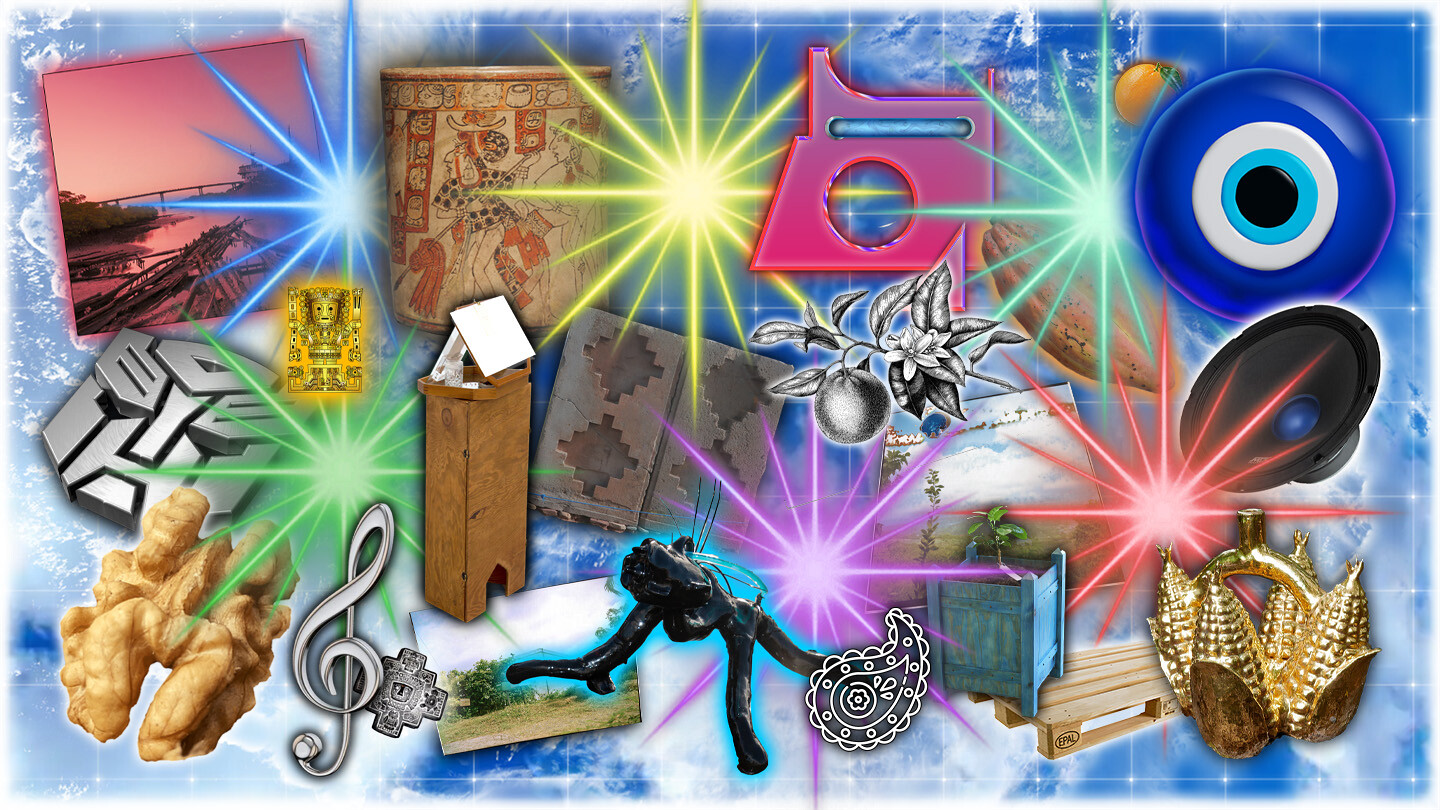August 2–October 6, 2024
Artists: Tin Ayala, Parisa Babaei, Emma Ben Aziza, Maéva Conderolle, Simon Gabourg
Curatorial team: Oulimata Gueye, Bettina Korintenberg, Gabriel Rossell Santillán, Thomas Charil, with the artists
A collision is any event in which two or more bodies exert forces on each other at a specific point in time and space. Coming from landscapes shaped by histories of migration, colonial pasts and their continuations, the five artists with works in this exhibition have chosen to reclaim “conflictive and contradictory diversity” in order to challenge the hegemonic universal gaze that has historically conceived their realities. The works created in the context of this exhibition seek to highlight abigarrado perspectives by detangling and also weaving stories through an urge to contest unidirectional answers. The concept of abigarrado is connected with the Aymara activist and sociologist Silvia Rivera Cusicanqui. In addition to asserting the right to confusion and the need to inhabit contradiction, her critical thinking has profoundly renewed the history of Bolivian resistance and social sciences, placing them within a complex indigenous history marked by the quest for self-determination. The artists’ poetic, relational, and often humorous approaches and practices explore how, collectively and at the same time situated in specific moments and locations, we can transform the world we live in through the transversal linking of ancestral strata, philosophies, practices, and technologies. In this continuous exploration, each movement is an invitation to a deeper understanding of a mutating world.
Claiming their belonging to the Andean land and history, Tin Ayala’s practice challenges the assertion that the fusion of Andean post-colonial societies with globalised consumerism objects is part of an acculturation process. Cholonización celebrates the revolutionary potential of neo-aymara and cholo communities that auto-determine their contradictory identity by generating an abigarrado space, which allows the survival of local cultural dynamics. Parisa Babaei examines the way images and texts affect us through language and social, political, and cultural relationships. In her piece Hammering a Wall-nut, she uses the proverbs and customs of walnuts and walnut trees to question the construction of femininity, which has been part of a logic of the reproduction and the exploitation of bodies since antiquity. Convinced that she belongs to a generation that should question their relationship to colonisation by taking into account their diasporic and contradictory identities, Emma Ben Aziza creates fragmentary ensembles, blurring the boundaries between the documentary, poetic writing, and fiction. The Museum of Useless Species analyses the school boxes (boîtes scolaires) invented at the beginning of the twentieth century by the Jardin colonial in Paris and distributed to elementary and high schools. Maéva Conderolle’s multidisciplinary practice reveals a concern for the ambivalence of visibility within the Black Atlantic. She inspects the porous strata where the domination of bodies and landscapes intersect. Volcano lips and their children stuck in the haze proposes seeing cocoa as a vessel of sensory archives. With a particular interest in technology and the mechanisms by which we become accustomed to it, whether through advertising, film, video games, or the images produced today by AI, Simon Gabourg imagines worlds that are inspired by the ways in which technical objects irrevocably determine our lives, but also carry within them their own destruction.
The exhibition is accompanied by a manifold programme including a DJ set with Ismael Condoii, a sonic celebratory reflection on global sound dynamics, and a culinary and historical inquiry on the entanglements between citrus fruits and colonialism with the researcher Samir Boumediene.
The exhibition at ifa Gallery Stuttgart takes place within the scope of the international post-graduate art programme by the École Nationale Supérieure des Beaux-Arts de Lyon (Ensba Lyon). The programme is supported by the Fondazione Sandretto Re Rebaudengo, Turin, the Association for the International Diffusion of French Art (ADIAF), the Bureau Français de Taipei, and the Convention Institut français & Ville de Lyon 2024.



